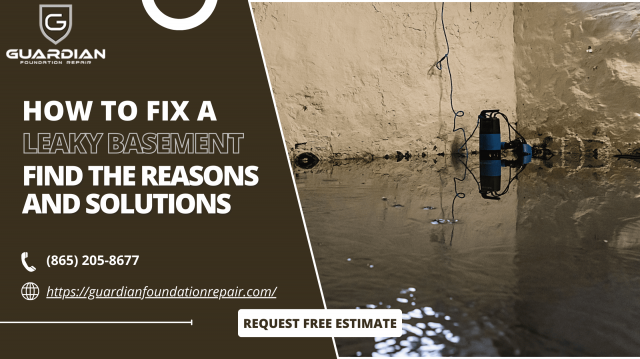If your basement leaks when it rains or is damp and smells musty in the summer, you need to take action! Don't let a wet basement ruin your home and put your health at risk. There are some solutions provided by a basement waterproofing expert to dry up that dampness and eliminate that musty odor. From simple DIY fixes you can tackle over the weekend to more complex repairs that may require professional assistance, there's a fix for every leaky basement problem.
No more mold and water damage! By addressing everything from tiny pipe gaps to the slope of your home, you can keep water out and maintain a dry and healthy basement. Find out how to fix a leaky basement and reclaim your space. It's time to find out why the basement is leaky and fix it so that you get a dry, comfortable, and healthy space.
Why Do You Have a Leaky Basement?
If you've been left scratching your head while staring at a wet and soggy basement, it's time to find the truth. Moisture is inclined to make its way into basements, and understanding the root causes is key to finding a solution.
There are two main culprits behind those unwanted water intrusions. The first is indoor humidity, which can lead to condensation and that dreaded "sweat" on your basement walls. If you've been noticing this phenomenon, your water problem is likely related to trapped humidity within your home.
The second is water vapor from the outside. Rainwater, groundwater, and melting snow can all seep into your basement if there are openings in your foundation. Cracks in walls and the foundation itself, as well as porous surfaces, can serve as gateways for water vapor to infiltrate your basement.
Don't let the risk of a leaky basement continue. Take control of your space with expert fixes from house foundation repair experts. Let's get to the bottom of this together!
The Best Methods to Fix a Leaky Basement
When you want to end those pesky basement leaks, follow these expert tips and practical solutions to address issues in your basement. Whether you need a quick fix or a comprehensive approach, basement waterproofing experts will guide you toward a dry, problem-free space.
Keep The Gutters and Downspouts Clean
Don't underestimate the power of maintenance when fixing a leaky basement. Neglected gutters could be the reason behind your moisture problems. Gutters and downspouts play a crucial role in redirecting rainwater as well as melted snow away from your home's foundation. A clogged gutter can cause water to saturate the soil around your foundation, leading to basement leaks. Follow these tips to clean your gutters and downspouts effectively:
- Safely climb up to the gutters using a sturdy extension ladder.
- Remove major debris from the gutters using your hands or a trowel.
- To remove the remaining debris, use a gutter vacuum, specialized leaf-blower attachment, or power washer with a fine spray nozzle.
- Flush the gutters with water to ensure only clear water flows through.
- Address downspout clogs by using a plumber's snake.
If you're not comfortable with climbing to your roof or have a multi-story home, consider hiring experts. They can efficiently handle the task and inspect your leaky gutter system for any necessary repairs or replacements. Keep your gutters clean to keep your basement dry and free from leaks!
Add Downspout Extensions
If your downspouts aren't directing water far enough away from your home's foundation, consider adding downspout extensions. A simple downspout leader installation can help prevent leaks caused by insufficient water diversion. You have a few options to choose from:
- Aluminum Gutter Downspout Extensions: These extensions attach to your existing downspouts, providing extra length to redirect water away from your home.
- Underground or Buried Downspout Extensions: Conceal your downspouts underground for a seamless and effective water diversion system.
- Splash Blocks: These channel-like blocks can be placed at the end of your downspouts to extend the reach of the water flow.
Hiring experts who can handle the job with expertise is recommended for more complex tasks like trenching or areas with deep frost lines. They will create the necessary trenches for each new downspout extension, ensuring proper water flow and preventing freezing in areas with low frost lines.
Plug Those Cracks and Gaps
Pay attention to the power of sealing cracks and gaps in your basement to prevent leaks. Take a quick visual inspection of your basement and look for any cracks or gaps around plumbing pipes. You can quickly seal these openings with a simple caulk and prevent water from seeping. If you need a sturdier solution, try using hydraulic cement that hardens when mixed with water, providing a more durable barrier against leaks.
Add a Dehumidifier
If your basement often feels damp and humid, installing a dehumidifier can be a simple and cost-effective solution. A dehumidifier helps reduce moisture levels, minimizing dampness and the risk of mold issues. Choose a dehumidifier that's appropriately sized for your basement and has the necessary power level and settings. If you're unsure, consult a professional who can recommend a dehumidifier that integrates seamlessly with your home's HVAC system for hassle-free operation.
French Drain Installation
For basements with multiple gaps and major waterproofing needs, a French drain might be the answer. A French drain creates a perimeter around your basement, merging into the concrete and effectively waterproofing the walls. Keep in mind that a French drain installation is a major investment involving excavation and concrete removal. It's recommended to seek professional assistance for this task, as they can guide you through the process and ensure it's done correctly.
Sump Pump Installation
Consider installing a sump pump system to channel excess water away from your home's foundation. Typically placed in the lowest point of the basement, a sump pump is part of a more extensive drainage system that collects water from walls, floors, and joints. It helps prevent water buildup and leaks. Consulting with a professional for sump pump installation can help you determine the best location and ensure it integrates seamlessly into your drainage system.
Yard Grading for Drainage
Want to prevent water from pooling around your home's foundation? Consider yard grading, a landscaping technique that creates a downward slope away from your foundation. It is a simple solution that can help fix a leaky basement. Look out for the following signs that indicate yard grading might be necessary:
- Soggy soil surrounds your home's perimeter.
- Puddles form around your home after rainstorms.
- Increased presence of mosquitos or other insects attracted to standing water.
- Rotting grass is caused by excessive lawn saturation.
If your yard already has a positive grading, where the soil slopes away from your foundation, you may not need yard grading. However, if your home has negative grading, meaning the foundation sits lower than the rest of your property, it's essential to consider yard grading. The technique can address basement flooding issues in homes with negative grading.
Easy Ways to Prevent a Leaky Basement
Basement leaks can occur due to your home's position or natural wear and tear. Understanding the causes will help prevent these issues. Here are some tips to keep your basement dry:
- Clean Basement Windows: Regularly clear away leaves and debris to prevent water from seeping in.
- Replace Old Windows: Swap out any old or leaking basement windows.
- Fix Gutters: Repair or replace damaged gutters to stop overflow.
- Improve Drainage: Provide proper drainage around your home's foundation.
- Maintain Plumbing: Regularly check and maintain water heaters, washing machine hoses, and drain lines.
- Repair Foundation Cracks: Promptly fix any cracks in your home's foundation.
- Check Your Roof: Repair any damaged or missing roof shingles.
- Level Surrounding Pavement: Adjust any settled pavement to direct water away from your home.
- Investigate Pooling Water: Seek help from a basement waterproofing expert to address any standing water.
- Install Moisture Detectors: Use detectors to get early warnings of any leaks.
DIY or Hire a Pro: Make the Right Choice for Basement Waterproofing!
For basement waterproofing, deciding whether to take the DIY route or hire a professional is required. Simple fixes like plugging cracks, replacing roof tiles, and adding downspout extenders can often be handled by homeowners with basic skills. By tackling these tasks yourself, you can save a considerable amount of money, especially considering the high hourly rates of professional plumbers.
However, if the issue goes beyond surface-level fixes or if you're unable to identify and address the source of the leak, it's best to contact a reputable basement waterproofing company. These professionals will assess the water damage and provide appropriate solutions to resolve the issue permanently. By bringing in experts, you can avoid costly foundation repairs and future mold remediation.
If you're experiencing leaky basement concerns in the Knoxville, Tennessee area, we recommend contacting the Guardian Foundation Repair team. With their expertise in basement waterproofing Tennessee, they will ensure your basement stays dry and cozy, providing you with peace of mind.






